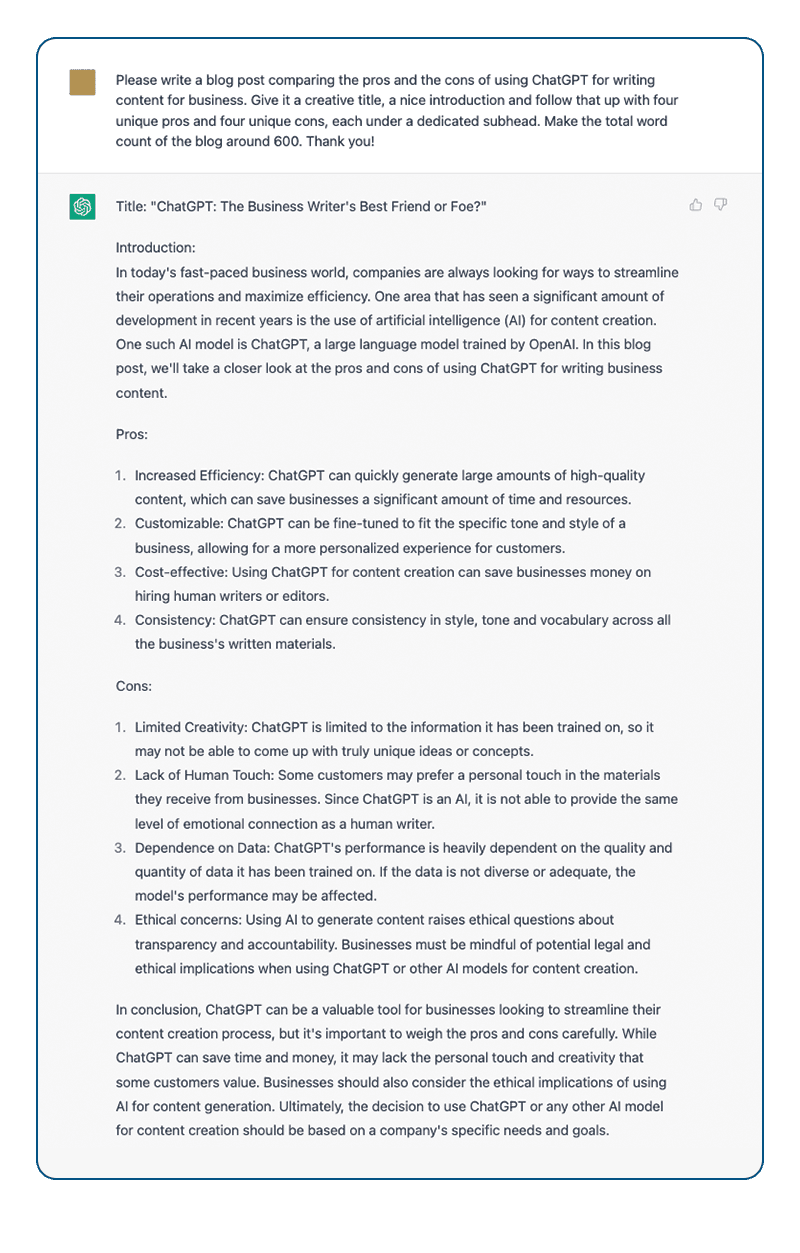Unless you live under a mighty rock on a deserted island where even satellite internet can’t reach, you’ve probably heard about OpenAI’s new ChatGPT.
It’s pretty fun. And it’s remarkably good at producing usable content. Our writers spent some time testing it out and were impressed.
We gave it prompts to write emails, blogs and social posts. We asked it industry-related questions and even had it proofread some of our copy. And although ChatGPT is the best AI for writers we’ve seen yet, we don’t plan to use it to write our content. Here's why.
Lack of original ideas
Although ChatGPT is great at stitching together existing information it has learned from, it’s not able to come up with new ideas. Everything it suggested to us has been done before. It can repeat what it’s learned, reorganize it and put it together in a different way, but it can’t think. For anyone who wants truly innovative ideas, a human brain will still be needed, at least for now.
Content quality
ChatGPT’s content lacks the creativity all good stories need. The AI is not capable of understanding the nuances of how humans communicate, which results in copy that’s generic and dry, even when you add a lot of detail and context to your prompts. It reads like your very first research paper, put together from multiple sources and rearranged just enough to feel original. Your paper was probably cited properly, too. The information you get from ChatGPT is not.
Impact on SEO
Google already gives priority to what they call “helpful content written by people, for people.” Although the AI is great at hitting all the right keywords search engines love to see, Google will recognize it as just that—keywords, and likely downgrade it in search results. We predict that disclaimers identifying whether specific content was written by AI or a human will be a thing not too long from now. Having real people oversee your content will be better for your local SEO. You can try starting with AI copy and then have a person review, rewrite a few things and edit for best results.
Accuracy
The more we used ChatGPT, the more we noticed that the information it returned was, at times, inaccurate, and the grammar was often questionable as well. Unless you’re an expert on the subject, you’ll want to do a lot of fact-checking to verify the answers.
Now, those are some of the cons. But there are many pros to the tool as well. Here’s what we think it’s good at.
It’s convenient (for some things)
It’s a lot easier to type a general question or a prompt in ChatGPT and get a direct answer right away, compared to using a search engine. You don’t need to scroll through pages of results to find what you need. You can take what the AI gives you and do further research, ask follow-up questions and, finally, fact check.
We should note that unlike a search engine, ChatGPT is not able to give local business recommendations, at least not yet. And depending on its scope and purpose, it may never do that.
Helps with writer’s block
Writing is a creative process. Some days it's easy, other days you may struggle to produce a simple sentence for a social media post. ChatGPT is great for helping you get started, create an outline and draft some prompts that will get your creativity going again.
Good at finding typos
Although we found that ChatGPT struggled with more complex grammatical situations, it’s excellent at proofing and looking for simple errors and typos.
Great at reorganizing content
When you have a lot of content that needs to be reformatted, reorganized or rewritten in a certain way quickly, ChatGPT truly excels. You can ask it to rewrite things for you from a different perspective, move things around according to your specifications and perform other bulk edits that are not possible with a word processor. This has been our favorite use case so far.
Considerations for insurance
As an agent, it’s critical your clients know you truly care about them because they trust you to protect the people and the things they care about most. So it’s especially important for you to be authentic and human in your emails, texts and things you put on your website or social media channels. If you choose to use AI to help you with content, review and edit everything diligently to make sure it feels like something you would actually write.
The verdict?
We love new technology and we absolutely encourage you to give ChatGPT a try. Just be mindful of its limitations and stay human, always.
Now, let’s see what this blog would look like if the AI wrote it.
